
Mariah Carey is an American singer, songwriter, record producer, and actress. An influential figure in popular music, she is known for her five-octave vocal range, melismatic singing style, and signature use of the whistle register. Carey is also credited with influencing vocal styles, merging hip-hop with pop through her collaborations, popularizing remixes, and helping break down racial barriers for multiracial Americans in popular culture. Referred to as the "Songbird Supreme" by Guinness World Records, she was ranked as the fifth greatest singer of all time by Rolling Stone in 2023, and has been dubbed the "Queen of Christmas" for the enduring popularity of her Christmas music, particularly the 1994 song "All I Want for Christmas Is You", which is the best-selling holiday song by a female artist.

Mariah Carey is the debut studio album by American R&B singer Mariah Carey, released on June 12, 1990, by Columbia Records. Its music incorporates a range of contemporary genres with a mix of slow ballads and up-tempo tracks. Originally, Carey wrote four songs with Ben Margulies, which solely constituted her demo tape. After Carey was signed to Columbia, all four songs, after being altered and partially re-recorded, made the final cut for the album. Aside from Margulies, Carey worked with a range of professional writers and producers, all of whom were hired by Columbia CEO, Tommy Mottola. Mariah Carey featured production and writing from Rhett Lawrence, Ric Wake and Narada Michael Walden, all of whom were top record producers at the time. Together with Carey, they conceived the album and reconstructed her original demo tape.
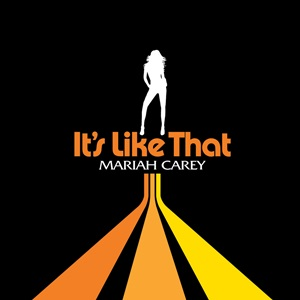
"It's Like That" is a song by American singer and songwriter Mariah Carey from her 10th studio album, The Emancipation of Mimi (2005). Written by Carey, Jermaine Dupri, Manuel Seal, and Johntá Austin, and produced by Carey, Dupri, and Seal, the song borrows the hook "It's Like That Y'all" from the Run–D.M.C. tracks "Hollis Crew" and "Here We Go (Live)". Several other tracks were contenders for the album's lead single. However, plans were changed when Island Def Jam Music head L.A. Reid suggested to Carey she record a few more strong songs to ensure the album's success, thus "It's Like That" was written and chosen as the album's lead single, being released on January 25, 2005.

"Can't Let Go" is a song recorded by American singer Mariah Carey for her second studio album, Emotions (1991). Columbia Records released it as the album's second single in November 1991. Featuring synthesizers and drum programming, "Can't Let Go" is a breakup song in the form of an R&B and pop slow jam. The lyrics, written by Carey, are about post-breakup sadness. She composed the music and produced the song with Walter Afanasieff, who had previously worked on her 1990 single "Love Takes Time". Carey's vocal range spans more than three octaves; her delivery is predominately breathy and in a low register, with whistle notes featured in the song's introduction and ending.

"Make It Happen" is a song by American singer and songwriter Mariah Carey. Written and produced by Carey and C+C Music Factory's David Cole and Robert Clivillés. It was released on April 4, 1992, by Columbia Records as the third and final single from her second studio album, Emotions (1991). The pop-, R&B-, and dance-influenced track incorporates traces of gospel in its bridge and crescendo. Described by author Chris Nickson as Carey's most personal and inspirational song, it tells of her personal struggles prior to her rise to fame, and how her faith in God helped sustain her.
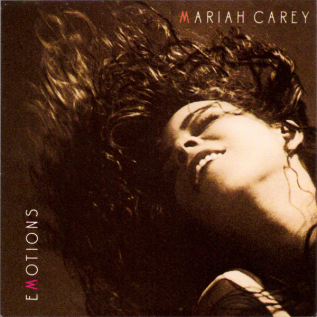
"Emotions" is a song recorded by American singer-songwriter Mariah Carey for her second studio album of the same name (1991). It was written and produced by Carey, Robert Clivillés, and David Cole of C+C Music Factory and released as the album's lead single on August 13, 1991 by Columbia Records. The song's lyrics has its protagonist going through a variety of emotions from high to low, up to the point where she declares, "You got me feeling emotions." Musically, it is a gospel and R&B song heavily influenced by 1970s disco music and showcases Carey's upper range and extensive use of the whistle register. Jeff Preiss directed the song's music video.

"I Don't Wanna Cry" is a song recorded by American singer Mariah Carey for her first album Mariah Carey (1990). Written by Carey and producer Narada Michael Walden, Columbia Records released it as the album's fourth single in March 1991. A Latin soul–influenced pop ballad, the torch song describes the end of romance. It features drums, guitars, digital synthesizers, and a classic song structure with highly delineated section roles. Modulations occur between these segments that emphasize the singer's emotions. Varying from whispering to belting, Carey's vocal range spans more than two octaves.

"Someday" is a song by American singer and songwriter Mariah Carey from her self-titled debut studio album (1990). It is a dance-pop, new jack swing and R&B song. Prior to Carey signing a record contract, she and producer Ben Margulies had written and produced a four-track demo which included "Someday". After signing a contract with Columbia Records, Carey began work on her debut album and she reached out to Ric Wake to ask if he would produce the song, to which he agreed. The composition of the demo recording was changed during the recording process, most notably replacing the horns with a guitar, which Carey disapproved of.

"Love Takes Time" is a song recorded by American singer Mariah Carey for her eponymous debut studio album (1990). Written by Carey and Ben Margulies, while produced by Walter Afanasieff, the song was released as the second single from the album on August 22, 1990, by Columbia Records. An adult contemporary-influenced ballad, the song follows its protagonist lamenting the loss of a lover and confesses that "love takes time" to heal and that her feelings for her ex-lover remain.
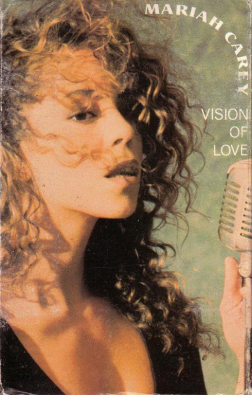
"Vision of Love" is the debut single by American singer-songwriter Mariah Carey for her eponymous debut studio album (1990). It was written by Carey and Ben Margulies. After being featured on Carey's demo tape for Columbia Records, the song was re-recorded and produced by Rhett Lawrence and Narada Michael Walden. The song features a slow-dance theme tempo and backing vocals sung by Carey herself, and introduces her usage of the whistle register. The lyric of the song represents her past life filled with "alienation" and how she had dreamt of achieving her triumph over adversity up to the moment when it finally came to fruition as the "vision of love" that she had always believed in, despite everything that she has had to deal with in life. This was Carey's debut record and was released as the lead single from Mariah Carey on May 15, 1990, by Columbia Records.

Emotions is the second studio album by American singer-songwriter Mariah Carey. It was released on September 17, 1991, by Columbia Records. The album deviated from the formula of Carey's 1990 self-titled debut album, as she had more creative control over the material she produced and recorded. Additionally, Emotions features influences from a range of different genres, as well as 1950s, 1960s and 1970s balladry infusion. On the record, Carey worked with a variety of producers and writers, including Walter Afanasieff, the only holdover from her previous effort. Additionally, Carey wrote and produced the album's material with Robert Clivillés and David Cole from C+C Music Factory and Carole King, with whom she wrote one song.

The First Vision is the debut video album by American singer and songwriter Mariah Carey, released by Sony Music Video on January 22, 1991. It is a collection of music videos, live performances, and film footage detailing the development and promotion of Carey's first studio album Mariah Carey (1990). Music videos of three Mariah Carey singles – "Vision of Love", "Love Takes Time", and "Someday" – are featured, as are snippets of the future singles "I Don't Wanna Cry" and "There's Got to Be a Way". The collection presents Carey performing at New York City's Club Tatou and behind-the-scenes footage of her rehearsing for appearances on Saturday Night Live and It's Showtime at the Apollo. During an interview segment, Carey answers questions about her life and music.

"Say Somethin'" is a song by American singer and songwriter Mariah Carey. It was written by Carey, Snoop Dogg, Chad Hugo, and Pharrell Williams, and produced by The Neptunes as the sixth and final single from Carey's tenth studio album, The Emancipation of Mimi (2005). The song is one of few from Carey's catalog in which she does not share production credits. "Say Somethin'" features Dogg as a guest artist, and is influenced by R&B and hip-hop music genres. Lyrically, the song is a dialogue in between and male and female, that discuss sexual themes and acts of which they plan to engage in a restroom.
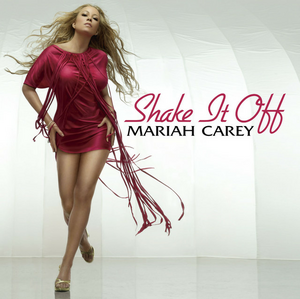
"Shake It Off" is a song recorded by American singer-songwriter Mariah Carey for her tenth studio album, The Emancipation of Mimi (2005). It was written and produced by Carey along with Jermaine Dupri, Bryan-Michael Cox, and Johntá Austin. The song was serviced to radio on July 11, 2005, by Island and Mercury Records as the album's third single in the United States, while "Get Your Number" served as the album's third single elsewhere. Described by Dupri as "ghetto," the track is a R&B song that makes use of pop and hip hop influences and a simple, sparse production. Lyrically, the song follows Carey as she moves on from her relationship with an unfaithful lover, packing her things and breaking up with him over an answering machine.

"Don't Forget About Us" is a song by American R&B singer and songwriter Mariah Carey. It was written by Carey, Jermaine Dupri, Bryan-Michael Cox and Johntá Austin, and produced by Carey, Dupri and Cox. On October 10, 2005, it was released as the lead single from the reissue of her tenth studio album, The Emancipation of Mimi:Ultra Platinum Edition (2005). The song is influenced by R&B and hip hop soul music genres, and lyrically chronicles the emotions felt by the protagonist after the loss of their relationship. Carey explained that the true meaning of the song is to be interpreted by the listener, therefore not disclosing its entire meaning publicly.

"Obsessed" is a song by American singer and songwriter Mariah Carey from her twelfth studio album, Memoirs of an Imperfect Angel (2009). The song was written and produced by Carey, Tricky Stewart and The-Dream, and was released as the album's lead single on June 16, 2009, by Island Records. The song draws musical influences from contemporary R&B and hip hop, and is built around a thumping bassline. Additionally, the song is accentuated by hand claps, while Carey's voice is processed with Auto-Tune. Lyrically, the song describes Carey's dilemma regarding constant claims of a prior relationship from rapper Eminem, although he is not specifically mentioned.

"Infinity" is a song by American singer-songwriter and record producer Mariah Carey from her sixth compilation album, #1 to Infinity (2015). It was released by Epic Records on April 27, 2015, as the only single from the album. Carey wrote the song in collaboration with Eric Hudson, Priscilla Renea, Taylor Parks and Ilsey Juber. Carey and Hudson also produced the track. It is an R&B song; the lyrics are about Carey putting herself first and emancipation. However, many critics likened the content to the singer's separation from her then-husband, entertainer Nick Cannon.

#1 to Infinity is the sixth greatest hits album by American singer-songwriter and producer Mariah Carey. It was released by Sony Music on May 15, 2015. It features Carey's then eighteen US number-one singles on the Billboard Hot 100. A new recording called "Infinity" was released as the only single on April 27, 2015. In January 2015, the singer announced that she had signed a residency deal to perform at The Colosseum at the Caesars Palace hotel in Las Vegas in May and July 2015, and would perform all of her number ones. As a result, she decided to re-release her first compilation, 1998's #1's, with an updated list of subsequent chart toppers. Carey promoted the album with her #1 to Infinity residency and with live performances at the Billboard Music Awards, Jimmy Kimmel Live! and Live! with Kelly and Michael.
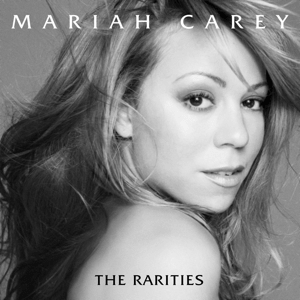
The Rarities is the eighth compilation album by American singer-songwriter Mariah Carey, released on October 2, 2020, by Columbia Records and Legacy Recordings. It is a part of "#MC30", a promotional campaign marking the 30th anniversary of Carey's self-titled debut studio album, Mariah Carey (1990), and coincides with her memoir The Meaning of Mariah Carey (2020). Featuring a mix of b-sides and previously unreleased material "with personal relevance and meaning" to Carey—some of which are discussed in her memoir—the album also includes a second disc consisting of audio from her March 7, 1996, live performance at the Tokyo Dome during her Daydream World Tour. A Blu-ray disc featuring enhanced video footage from the concert was released exclusively in Japan.

Someone's Ugly Daughter is an alternative rock album by American band Chick. It was released on September 5, 1995, through Epic Records and 550 Music.




















